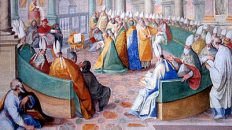THEME: “ETERNAL HAPPINESS”
In the history of Philosophy vis-à-vis the ancient epoc, Aristotle, more than anybody else, enshrines happiness as a central purpose of human life and a goal in itself. As a result, he devotes more space to the topic of happiness than any thinker prior to the modern era. It is worthy of note that he draws some similar conclusions; that is, happiness depends on the cultivation of virtue, though his virtues are somewhat more individualistic… however, there is a sense here, and we can import this concept into our Christian parlance. Above all, for Aristotle, “happiness depends on ourselves.” Hence, Happiness could be understood as a mental or emotional state of well-being defined by positive or pleasant emotions ranging from contentment to intense joy.
In consonance to the foregoing, today’s readings define our Christian goal of ETERNAL HAPPINESS and explain the attitudes and actions necessary to reach it. In the Beatitudes, Jesus outlines the values and attitudes needed to enter and enjoy God’s kingdom: poverty of spirit, hunger and thirst for justice, compassion, meekness, mercy, integrity, peace-making and the willingness to suffer persecution for the sake of justice. In essence, the Beatitudes both fulfill and complete the Ten Commandments which stress the “Thou shalt nots.” But Jesus presents the Beatitudes in a positive sense, as the virtues in life which will ultimately lead to the rewards of salvation – not in this world, but in the next.
Zephaniah, in the first reading (ZEP 2:3; 3:12-13), calls a “moral minority” of the Jews of his time “HAPPY” OR “BLESSED” because they seek justice, humility, truth and righteousness, thus making a declaration of dependence on God.
Consequently, in the Second Reading (1 COR 1:26-31), Paul advised these Christians to use their gifts and heaven-sent blessings for the good of the community, not just for their own aggrandizement, reminding them of the contrast between Christ’s values and the world’s values; thus aiming “eternal happiness”
In a nexus, the Gospel according to Matthew (MT 5:1-12A), concretizes what we have been saying. Jesus instructs his disciples in the paradoxical blessedness/happiness of poverty, hunger, sorrow and persecution. In poverty, we recognize God’s reign; in hunger, His providence; in sorrow, true happiness; and in persecution, true joy. In other words, the blessed on Jesus’ list are the poor in spirit, compassionate, meek, merciful, clean of heart and peacemakers and those who are willing even to be insulted and persecuted for their lived Faith in Him.
Just as Aristotle opines that happiness depends on the cultivation of virtue; Christ in the gospel reading stresses out this reality by the beatitudes. Hence, we need to cultivate the virtue of purity, spiritual poverty, meekness, peace, compassion etc. in order to attain that ETERNAL HAPPINESS of the world to come.
Each of the inspired authors of today’s readings, Zephaniah, Paul and Matthew, “makes a motion,” that each of us should consider making a Declaration of Dependence on God and then work with His grace to lead virtuous and happier lives.
The message of today is simple: we need to respond to the challenge of the Beatitudes in daily life. We need to create true happiness wherever we find ourselves in order to achieve the eternal happiness. Millions are starving, persecuted, homeless, and leading hopeless lives. The Beatitudes propose to us a way of life, inviting us to identify with the poor, those who mourn, the meek, and those who hunger and thirst after justice. They challenge us to be compassionate people, to be men and women who are pure in heart, and to become the peacemakers in our dealings with one another, in our families and in the society at large, even when this approach to things exposes us to ridicule and persecution. “As long as you did it to one of these, my brethren, you did it to me” is the criterion for our Last Judgment.
“O that today you would listen to his voice, harden not your hearts…”
HAPPY SUNDAY!!!
© Chinaka’s Reflections, 2017





